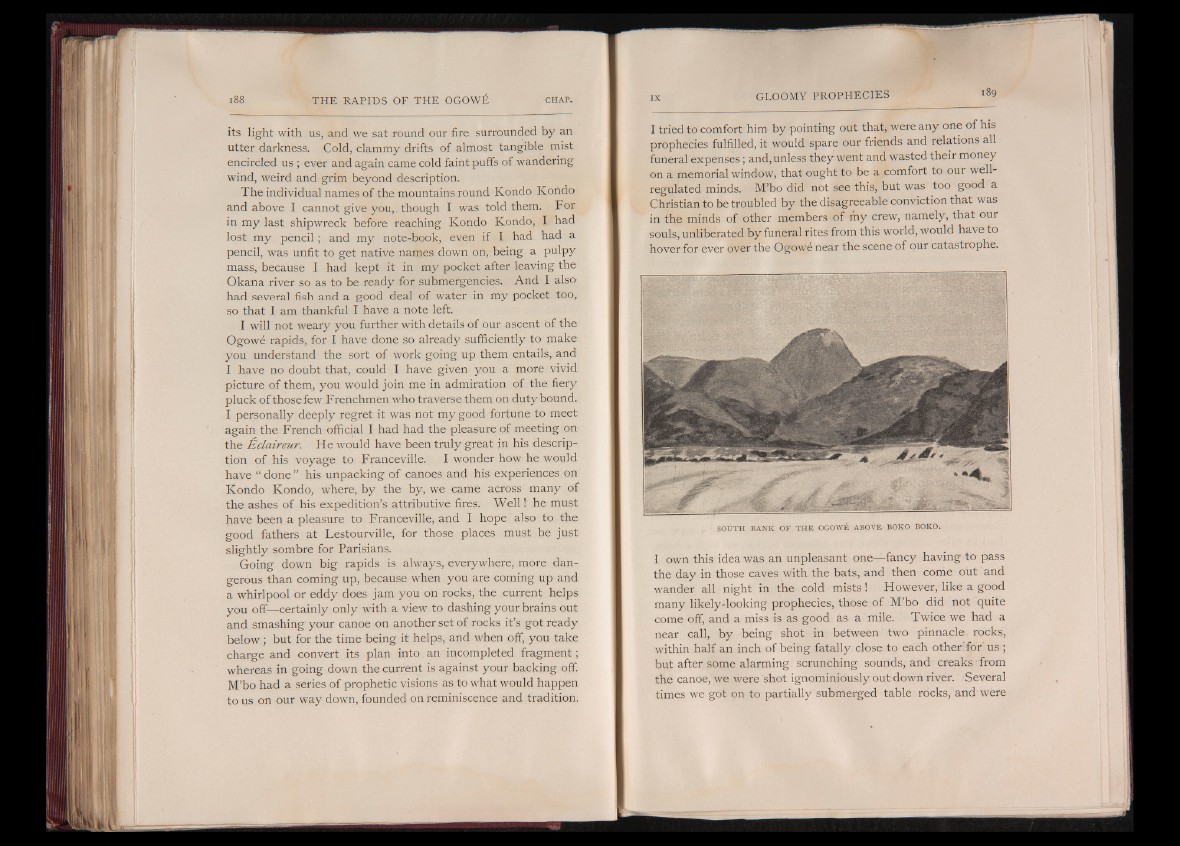
its light with us, and we sat round our fire surrounded by an
utter darkness. Cold, clammy drifts of almost tangible mist
encircled us ; ever and again came cold faint puffs of wandering
wind, weird and grim beyond description.
The individual names of the mountains round Kondo Koiido
and above I cannot give you,. though I was told them. For
in my last shipwreck before reaching Kondo Kondo, I had
lost my pencil ; and my note-book, even if I had had a
pencil, was unfit to get native names down on, being a pulpy
mass, because I had kept it in my pocket after leaving the
Okana river so as to be ready for sübmergencies. And I also
had several fish and a good deal of water in my pocket too,
so that I am thankful I have a note left.
I will not weary you further with details of our ascent of the
Ogowé rapids, for I have done so already sufficiently to make
you understand the sort of work going up them entails, and
I have no doubt that, could I have given you a more vivid
picture of them, you would join me in admiration of the fiery
pluck of those few Frenchmen who traverse them on duty bound.
I personally deeply regret it was not my good fortune to meet
again the French official I had had the pleasure of meeting on
the Éclaireur. He would have been truly great in his description
of his voyage to Franceville. I wonder how he would
have “ done ” his unpacking of canoes and his experiences on
Kondo Kondo, where, by the by, we came across many of
the ashes of his expedition’s attributive fires. Well ! he must
have been a pleasure to Franceville, and I hope also to the
good fathers at Lestourville, for those places must be just
slightly sombre for Parisians.
Going down big rapids is always, everywhere, more dangerous
than coming up, because when you are coming up and
a whirlpool or eddy does jam you on rocks, the current helps
you off— certainly only with a view to dashing your brains out
and smashing your canoe on another set of rocks it’s got ready
below ; but for the time being it helps, and when off, you take
charge and convert its plan into an incompleted fragment ;
whereas in going down the current is against your backing off.
M’bo had a series of prophetic visions as to what would happen
to us on our way down, founded on reminiscence and tradition.
I tried to comfort him by pointing out that, were any one of his
prophecies fulfilled, it would spare our friends and relations all
funeral expenses; and, unless they went and wasted their money
on a memorial window, that ought to be a comfort to our well-
regulated minds. M’bo did not see this, but was too good a
Christian to be troubled by the disagreeable conviction that was
in the minds of other members of my crew, namely, that our
souls, unliberated by funeral rites from this world, would have to
hover for ever over the Ogowe near the scene of our catastrophe.
S O U T H B A N K O F T H E O G O W E A B O V E B O K O B O K O .
I own this idea was an unpleasant one— fancy having to pass
the day in those caves with the bats, and then come out and
wander all night in the cold mists! However, like a good
many likely-looking prophecies, those of M’bo did not quite
come off, and a miss is as good as a mile. Twice we had a
near call, by being shot in between two pinnacle rocks,
within half an inch of being fatally close to each other for us ;
but after some alarming scrunching sounds, and creaks from
the canoe, we were shot ignominiously out down river. Several
times we got on to partially submerged table rocks, and were